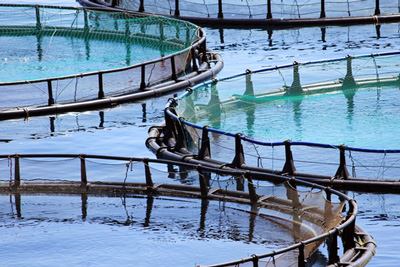Plant-based feeds altering the nutritional benefits of farmed seafood
- Like
- Digg
- Del
- Tumblr
- VKontakte
- Buffer
- Love This
- Odnoklassniki
- Meneame
- Blogger
- Amazon
- Yahoo Mail
- Gmail
- AOL
- Newsvine
- HackerNews
- Evernote
- MySpace
- Mail.ru
- Viadeo
- Line
- Comments
- Yummly
- SMS
- Viber
- Telegram
- Subscribe
- Skype
- Facebook Messenger
- Kakao
- LiveJournal
- Yammer
- Edgar
- Fintel
- Mix
- Instapaper
- Copy Link
Posted: 15 March 2016 | Victoria White | No comments yet
Using vegetable oils in feed instead of fish oil changes the fatty acid content of fish and nutritional value for human consumption…


The fish-farming industry is increasing its use of plant-based ingredients in its feed and moving away from traditional feed made from fish, which could impact some of the health benefits of eating certain types of seafood, suggests a new analysis.


Fish farming, also known as aquaculture, is the fastest-growing food animal sector, outpacing the beef and poultry industries. While wild fish find their own food – which includes smaller fish for carnivorous species — intensively farmed fish are fed a manufactured aquaculture feed. Until recently, this manufactured feed was typically composed of high levels of fishmeal and fish oil derived from wild fish — but it has become unsustainable to catch more wild fish to feed growing numbers of farmed fish, so the industry has shifted the makeup of the feed. For example, twice as much soybean meal was used in commercial aquaculture feed in 2008 as compared to fishmeal, and the use of crop-based ingredients is projected to increase 124 percent between 2008 and 2020.
“Farmed fish get their health-promoting omega-3 fatty acids, EPA and DHA, from their feed, and specifically from fish oil,” says study leader Jillian Fry, PhD, director of the Johns Hopkins Centre for a Livable Future (CLF) Public Health and Sustainable Aquaculture Project. “Our review found that increasing plant-based ingredients can change the fatty acid content in farmed fish, which can affect human nutrition.”
The new study details the industry shift to crop-based feed ingredients, such as soy, corn, and wheat, to replace wild fish as a key ingredient in manufactured feed. The researchers reviewed aquaculture and public health literature, and conducted a new analysis to estimate the environmental footprint for the top five crops used in commercial aquaculture feed.
The shift has been hailed by some as a positive change in light of the increasingly depleted oceans and the rapidly expanding aquaculture industry. But the shift may have some unintended consequences as well.
Vegetable oils changes the fatty acid content of fish
Using vegetable oils instead of fish oil changes the fatty acid content of fish and nutritional value for human consumption, the researchers say. Considering consumers are encouraged to consume seafood high in omega-3 fatty acids, which promote improved cardiovascular health and neurodevelopment, this has large implications for dietary recommendations and the aquaculture industry. More research is needed, they say, to better understand the impact of this shift in feed on the health benefits of consuming farmed fish.
While fish-based ingredients are seen as acutely limited, so are the resources such as land, water and fertiliser used to produce feed crops. Aquaculture’s environmental footprint likely now includes increased nutrient and pesticide runoff from the industrial crop production needed to supply fish food. This runoff is a key driver of water pollution globally, and can negatively impact public health.
Fry says that these new findings may raise more questions than they answer: “The nutritional content of farmed fish should be monitored. The aquaculture industry should assess the environmental footprint and public health impacts of their crop-based feed ingredients and seek those produced using sustainable methods.”









